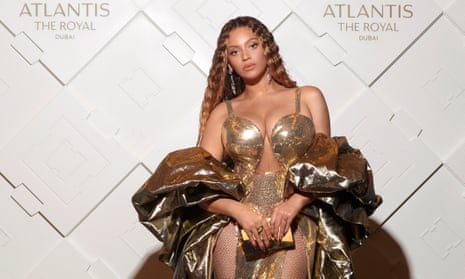It’s not a Beyoncé comeback if it doesn’t “cause all this conversation”, and the musician’s first concert in more than four years has been no exception. Over the weekend, Beyoncé was paid a reported $24m to perform at the unofficial opening of luxury Dubai hotel Atlantis the Royal, in front of an invitation-only audience of celebrities, influencers and journalists. But this choice of location for Beyoncé’s return to live performance – her first since the release of last year’s widely acclaimed Renaissance, although none of the album’s tracks were on the set list – has proved divisive.
Fans may well feel disappointed to see Beyoncé prioritise a private performance in Dubai for largely wealthy attenders, including Ronan Keating and Michelle Keegan of all people, given that she’s yet to release videos for the album, let alone announce the long-anticipated Renaissance tour – for which ticket prices are expected to be eye-watering. But the majority of online criticism has been driven by UAE’s laws criminalising homosexuality and gender reassignment.
To some, Beyoncé’s performance in the UAE undermines the explicit purpose of Renaissance, which she has dedicated to Black queer culture. As expected, the performance has led to a heated online tug-of-war between righteous criticism and furious defence from devoted stans. Some defenders of Beyoncé have noted that UAE is not the only nation with anti-LGBTQ+ legislation, questioning if people would protest at her performing in her home state of Texas – where legislation outlawing sodomy, though made defunct by the Lawrence v Texas 2003 supreme court ruling, still exists, and may even be reinstated following the overturning of Roe v Wade – and saying that queer Emiratis deserve to see Beyoncé live, too. And many have correctly pointed out that Kylie Minogue’s New Year’s Eve set at Atlantis the Royal should have come under equal fire – although the anticipation for Beyoncé’s live return, plus her wider international appeal, heightened the response to her performance. (Meanwhile Spice Girl Melanie C cancelled a New Year’s Eve performance in Poland after being made aware of issues “that do not align with the communities I support”: widely inferred to be the state of LGBTQ+ rights in the country.)

Representatives for Beyoncé have not responded to requests for comment on her decision to perform in the country. Defenders among her fanbase have also noted that there have been no recorded arrests, prosecutions or state punishments for same-sex sexual activity in the UAE since at least 2015. But it bears stating that 88.1% of UAE’s total population is made up of migrant workers: what this means in practice, as research by the London School of Economics has shown, is that both gay Emiratis (through citizenship) and wealthy migrant workers (through class) have been privileged enough to effectively navigate UAE’s underground gay social scene while evading Emirati authorities. But for poorer, queer migrant workers from India, Bangladesh, Egypt and the Philippines, many of whom are undocumented, or were denied birth certificates, it cannot be assumed that a lack of recorded prosecutions means that the UAE has been safe for them.
The issue of migrant labour adds an additional dimension to conversations on the ethics of concerts – it’s as much about where Beyoncé performs as who she’s performed for and who she’s accepted money from, namely business magnates whose activities are inextricably linked with the state and aggravate the worst excesses of inequality and exploitation. The UAE has laws and initiatives to protect migrant workers, and yet allegations are rife that much of Dubai’s luxury playground has been built under appalling conditions amounting to indentured servitude.
The specific labour conditions behind the construction of Atlantis the Royal – owned by Kerzner International, which has an estimated yearly revenue of $3.1bn and was founded by the late South African business magnate Sol Kerzner – are unknown. But with the Investment Corp of Dubai, the emirate’s sovereign wealth fund, purchasing a stake in Kerzner in 2014, there is a direct shared interest between the state and the building of luxury hotels. That a hypothetical wealthy gay Emirati might enjoy seeing Beyoncé perform is of little relevance to this material reality. Renaissance’s lead single, Break My Soul, may have been billed as the pro-worker Great Resignation anthem of last summer, but it is muted when money talks.
Even ardent Beyoncé fans should find it hard to be surprised. As author and broadcaster Emma Dabiri wrote of Beyoncé and Jay-Z’s 2022 Oscars afterparty crossing the picket line of Chateau Marmont workers, wealthy celebrities are “untroubled” by the “inconvenient demands” of exploited workers – though in the case of Atlantis, workers don’t even have a voice or forum for complaint due to the UAE’s lack of trade unions. And yet, many fans still prostrate themselves to defend her, unwilling to countenance the capitalist realities of her project as if it might undermine their love for her deeply felt music. It’s not a contradiction for both to coexist. Why not have it both ways? Beyoncé certainly does.

